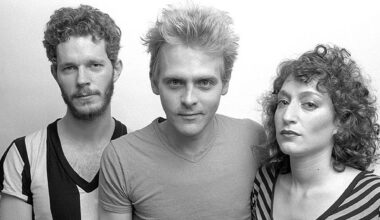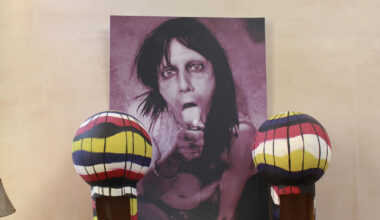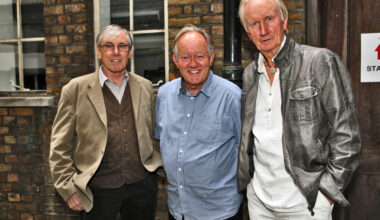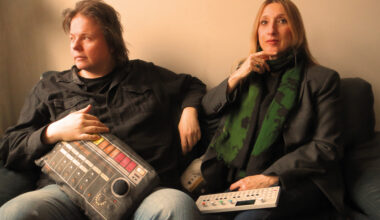Performing alternative soundtracks to cult movies, Asian Dub Foundation’s Chandrasonic and Factory Floor’s Gabriel Gurnsey – who between them have tackled ‘La Haine’, ‘THX 1138’ and ‘Metropolis’ – explain what it’s all about, Alfie
A great soundtrack can hardwire movie moments into our memory. Picture the futuristic Los Angeles of ‘Blade Runner’ and you can hear the saxophone winding its way around Vangelis’ metallic chords. Watch an ‘Inception’ street collapsing inwards and Hans Zimmer’s bombastic bass notes are not far behind. And who can forget the shrieking violins taking a shower in ‘Psycho’, or Beethoven pouring into wide droog eyes in ‘A Clockwork Orange’. All these moments are sacred cows branded in time; cattle-ironed into our consciousness.
You may want to be sitting down for this next bit. There are musicians out there who find that classic soundtracks are not enough. They’ll sit there with a bucket of sticky popcorn and their minds will fizz with different noises. The braver ones will then hire a venue, shove a film onto a big screen and perform a whole new live score for an audience. ‘The Italian Job’ car chase set to the Benny Hill theme tune? Yes please. Rocky’s workout montage with ‘It’s Raining Men’? Absolutely. And away with your pitch-bending Yamahas, Mr Vangelis, Deckard is entering screen-left to a kazoo.
In 2014, when Radio 1 invited artsits to rescore Nicolas Winding Refn’s ‘Drive’, a soundtrack with a higher Amazon rating than the film itself, Twitter became so overheated it nearly lifted the bonnet off. “Replacing all the tunes in ‘Drive’ is like replacing Ryan Gosling with Ralf Schumacher,” said one Twitter pundit, while someone else compared the exercise to Gus Van Sant’s clunking shot-for-shot remake of ‘Psycho’. The event’s curator, DJ Zane Lowe, defended the idea saying, “We have not steamrolled in… it is a parallel experience that you can choose to watch or not.”
So what would, er, drive someone to re-soundtrack a film, especially with a live audience and the whole of Twitter waiting in judgement? In 1995, Mathieu Kassovitz went easy on the incidental music for his movie ‘La Haine’, but an accompanying “inspired by” soundtrack popularised French hip hop from Normandy to Nice.
The brutal Parisian riots depicted in the film, released in the US as “Hate”, became as seared into the French consciousness as ‘Trainspotting’ was in the UK. in 2001, a few years after its release, rapcore rascals Asian Dub Foundation re-soundtracked ‘La Haine’ at a special event at The Barbican .

Despite their plaudits over the years – a Mercury Prize nod, a UK Asian Music Award and a (refused) MBE – ADF are not the first band you’d expect to produce something as ambitious as a live re-soundtrack. It’s the kind of thing orchestras do, right? Which triggers a memory with the band’s Chandrasonic.
“When I was 11,” he says. “I was taken to Rank film studios to watch an orchestra dub a Hammer Horror film. It was quite a radical thing to see when you’re that age. It stayed with me: that’s the real reason all this happened. Although when the Barbican Centre wanted us to work with a classical composer, we didn’t like it, that’s when I said we’d do a live soundtrack to ‘La Haine’.”
Their rescoring of this vache sacrée included what Chandrasonic calls “concrete jungle terror loops”. Critics loved it and the band toured the show for over a decade, including in 2012 a performance at the notorious Broadwater Farm estate where riots had erupted the previous summer. The police weren’t happy.
“You put a provocative film on in a tinderbox and they’ll try to close it down, but of course it wasn’t like that at all,” says Chandrasonic.
It’s a reminder that re-soundtracking in front of an audience is tricky, particularly if there are improvised elements. What frame rate is the film running at? If it’s not got subtitles, can people hear the dialogue? How do the musicians see a screen that’s facing an audience? Chandrasonic fondly recalls a scrappy 1996 club residency to which Apollo 440’s DJ Harry K invited acts like Tricky and Paul Hartnoll to spin discs over projected films. Tricky simply ignored the record box re-soundtracking theme and DJed whatever the heck he wanted. He also recalls Scanner’s psychedelic rescoring of Jean-Luc Godard’s ‘Alphaville’.
“He sat in a cinema chair in the audience with a digital four-track. They’d got the wrong lens and everyone looked short and fat, but he created this disorientating thing where the English dub of the subtitles was out of sync. Most people wanted their money back, but I thought it was fantastic: there was this sense of reality being bent.”
“It’s incredibly satisfying to do a soundtrack,” says Gabriel Gurnsey of Factory Floor, who earlier this year were asked by London’s Science Museum to produce a live re-soundtracking of the biggest of them all: Fritz Lang’s silent epic ‘Metropolis’. Even if you’ve not seen the film, you know its central image: a towering silver robot looking like the Statue of Liberty prepping for a particularly aggressive hen-do. About a decade ago, museum workers in Argentina found a stack of long-lost ‘Metropolis’ deleted scenes. The resulting extended version was the one that Factory Floor had to rescore. Gurnsey, a drummer by trade, took this as a particular challenge.
“Usually our live sets are hectic with drums,” he says, “but it’s a long film and two-and-a-half hours of drumming would have been crazy. We wrote it per scene, and it was a good opportunity to create rhythm through modular synths instead of drums so we had this constant pulse all the way through.”
The ‘Metropolis’ show went down well, with one review describing it as a “bubbling sonic assault” that tore “several new orifices” in the museum. Yeesh.
“It’s quite an organic film, with the model buildings and old school graphics,” says Gurnsey, “and the way we work is modular like that. It’s also a film about the future and robotics, and that matched the motorik thing that Factory Floor has.”

A longer-lasting legacy of Factory Floor’s performance may well be seen on their next album, due sometime in 2018.
“It was a massive step forward for our sound between albums,” says Gurnsey. “We were not entertaining people in a club, it was a different atmosphere outside our comfort zone. This will feed back into the way we’ll work on new stuff: maybe we’ll have a film on in the background. We always work with visuals anyway.”
Factory Floor’s reinvigorated energy offers a clue to why musicians reinvent movies. It’s less about the film and more about creating something within your own universe – as long as that film’s themes are integral to what you do. And it could be argued that re-soundtracking helped maintain Asian Dub Foundation’s reputation way beyond the 1990s. They went on to rescore ‘The Battle Of Algiers’ and the early George Lucas film ‘THX 1138’.
“You are making a separate piece of art,” says Chandrasonic. “Sometimes you can get bolshy and think you’re going to redefine the focus of the film. But doing it live, there are all kinds of variable factors: the venue, the expectations people come with. If you cling onto the original film being untouchable, then it takes a lot more to dislodge you from your prejudices.”
Re-soundtracking will carry on apace, whether it’s thoughtful extensions of cinematic legacies as described here, or, y’know, playing rave music over ‘The Little Mermaid’. It’s spreading to television too. There are few TV soundtracks as famous as the work by Angelo Badalamenti on ‘Twin Peaks’, and it seems the new series is a hit with people who like to be confused at things. Doom-gaze band A Place Both Wonderful And Strange rescored David Lynch’s work at the deliciously dark yet sadly defunct Morbid Anatomy Museum in Brooklyn. Also in Brooklyn, Silent Drape Runners provided an occultish re-tracking to the original TV series.
“We definitely love Badalamenti’s work,” say the Runners. “No one could say we are even in the same realm as him.”
And yes, it’s true, it actually happened. Silent Drape Runners have also re-soundtracked ‘The Little Mermaid’ with rave music.
Meanwhile, Factory Floor will continue to tour ‘Metropolis’, but don’t expect any more film fiddling from Asian Dub Foundation. Now that people can simply dump a film onto their laptop and chuck a load of audio onto it by tapping a few keys – or just waggle GarageBand at Netflix – the magic has gone for Chandrasonic.
“It was a technological knife-edge,” he says “We were literally pressing ‘Go’ on our sequencers all at the same time. I don’t want to sound like someone who’s anti-progress, but it’s a bit deskilled now.”
Next time you’re cutting off someone’s ear in a warehouse, murdering a paying motel customer in a shower, haunting someone doing pottery, or flying around LA assassinating replicants, listen to the noises in your head. You won’t be the only one re-soundtracking movie history.





